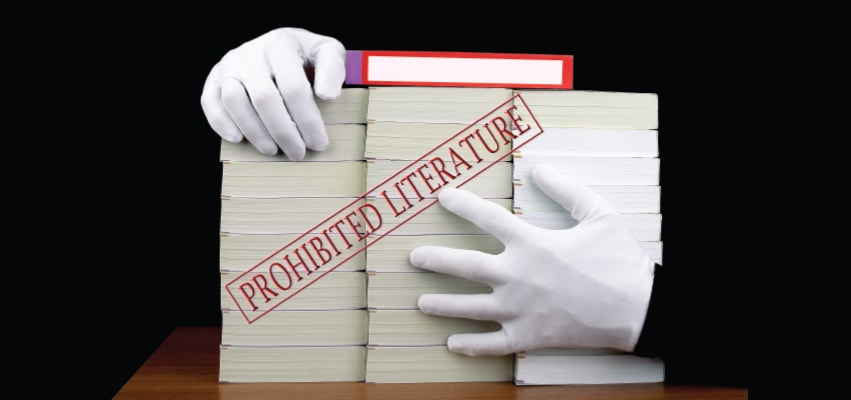The quote reads like it’s ripped from today’s headlines, but it’s actually from the “Freedom to Read” policy adopted 70 years ago this summer by the American Library Association and American Book Publishers Council.
Then, as now, libraries across the country were being called upon to remove books and other materials.
In December 1951, the New York State Board of Regents appointed a three-man commission to investigate public school textbooks for “subversive material.” In Sapulpa, Okla., books dealing with “socialism and sex” were burned. The classic story Robin Hood was banned in Vincennes, Ind., for “its communistic influence.” Even the Peoria Public Library was criticized for screening what some believed were Soviet propaganda films.
But few stories of censorship were as widely covered as the Illinois State Library’s removal of thousands of books in 1953, a story that made national and international news. The entire story is covered thoroughly in the Illinois State Library archives, but it follows much the same path as today’s challenges. A parent objected to a book, reported it to local authorities who reached out to the governor, who demanded action. The response: Some “6,000 to 8,000 volumes” were banned within a month by the Illinois State Library, which made it clear “more would follow.”
Among the books pulled were works from Sinclair Lewis, John Steinbeck, Norman Mailer, Frank “Mickey” Spillane and John O’Hara, among others.
“Most of the withdrawals were recently published works, including four of the 20 most popular books of the year,” according to the State Library’s account. “One book, The Wonderful Story of How You Were Born, was pulled despite a reported endorsement by the Girl Scouts of America.”
Today, 70 years later, similar stories are emerging across the country.
In Fredericksburg, Va., the Spotsylvania County School Board this past November unanimously approved removing all books containing “sexually explicit” material, with one school board member openly advocating for them to be burned.
In October, prosecutors in Gillette, Wyoming considered filing charges against staff at a local public library for allegedly distributing obscene material to minors for stocking books like Sex Is a Funny Word.
In Texas, a state lawmaker made national news by starting a statewide inquiry into 850 books he deemed objectionable. He sent a letter to the Texas Education Agency and school superintendents asking them to acknowledge what books they owned from his list, as well as a detailed accounting of where they are and how much was spent on them.
According to a recent report from PEN America, a literary and free expression advocacy organization, school districts in 26 states have either banned or opened investigations into more than 1,100 books just between July 2021 and March 2022.
Between 2020 and 2021, the number of challenges nationwide to library materials has more than tripled, according to the American Library Association’s Office for Intellectual Freedom.
Peoria Public Library, meanwhile, has not seen an uptick in book challenges.
“I believe our community recognizes and respects that we are committed to filling our collection with a wide range of ideas, issues and viewpoints,” said Peoria Public Library Executive Director Randall Yelverton. “The existence of something in the collection is not an endorsement, but an expression of our support of intellectual freedom.
“That said, if we can help sensitively address topics such as racism, sexism and inequality in all forms through community engagement and education, then we will eagerly fill that role,” said Yelverton, noting the library’s new book club for tweens and teens offers a safe space for them to discuss books that mirror their life experiences. “We are always striving to uphold the tenets of ‘Freedom to Read,’ including the most critical, which is that the freedom to read is essential to our democracy,” Yelverton said.
The American Library Association, along with the American Book Publishers Council, officially adopted its “Freedom to Read” policy on June 25, 1953, excerpts provided below.
“We believe that free communication is essential to the preservation of a free society and a creative culture. We believe that these pressures toward conformity present the danger of limiting the range and variety of inquiry and expression on which our democracy and our culture depend. We believe that every American community must jealously guard the freedom to publish and to circulate, in order to preserve its own freedom to read…”
The freedom to read is guaranteed by the Constitution. Those with faith in free men will stand firm on these constitutional guarantees of essential rights and will exercise the responsibilities that accompany these rights.
To access the Illinois State Library’s Heritage Project and the 1950s book banning controversy, visit:





